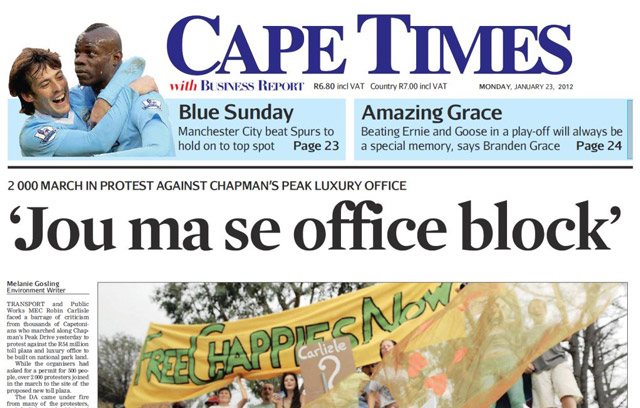
The South African National Editors’ Forum (Sanef) on Monday said it was appalled by the Western Cape government’s call for all provincial departments to stop subscribing to the Cape Times.
“Sanef finds it appalling that the executive committee of the Western Cape government, led by a former journalist, Ms Helen Zille, interferes at this level in the affairs of provincial department heads, who should have the freedom to choose which news mediums they find useful or not,” Sanef chairman Mpumelelo Mkhabela said in a statement.
In a letter to all department heads, director-general Bert Gerber issued a directive for the departments not to renew their subscriptions or start subscriptions with the paper.
“Cabinet has discussed with concern the ongoing decline in the quality of reporting in the Cape Times. As we get newspaper cuttings every day, cabinet considers it to be fruitless expenditure to renew Cape Times subscriptions,” Gerber wrote.
Mkhabela said the issue could have been handled differently.
“If the Western Cape government has an issue with the quality of content in the Cape Times, they should address it with the editor of that newspaper or through complaints to the office of the Press Ombudsman, and not by effectively calling for a government boycott of the Cape Times,” he said.
Sanef’s management committee intended to send a letter of protest to the Western Cape government. It called for the decision to be rescinded.
Premier Helen Zille said the provincial government had done nothing wrong.
“No newspaper has the right to demand that anyone subscribes to it. Everyone, including governments, make informed consumer choices,” she said.
Zille said the provincial cabinet had taken a unanimous decision not to renew its subscriptions and this in no way threatened press freedom.
“Is Sanef suggesting that if we, as government, get poor service from a caterer (for example) that we should not switch to another service provider? Must we rather lay a complaint at the consumer council and continue using an inferior service provider?” she asked.
Zille said newspapers had no special product status for consumers.
“Publishers can publish what they like, readers can read what they like. That seems to me a logical starting point in an open society,” she said. — Sapa




